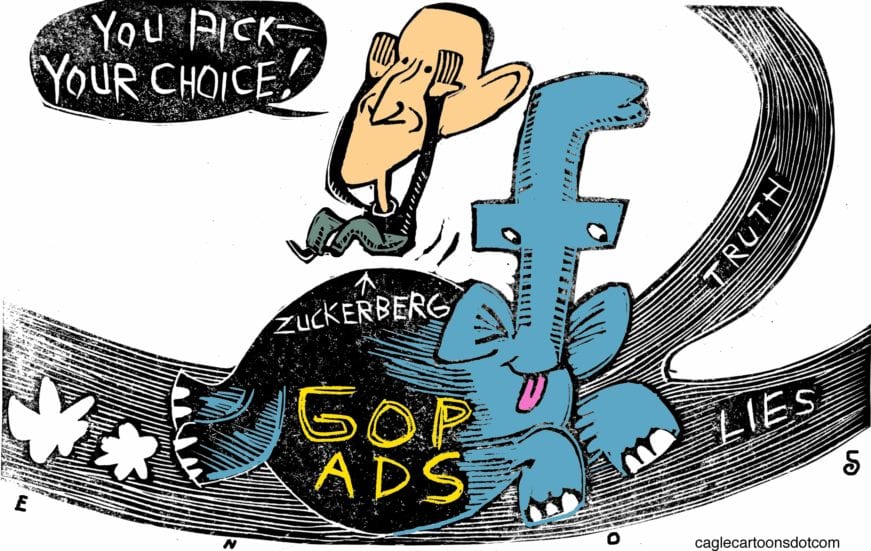Mark Zuckerberg is certainly a genius, but not when it comes to understanding the First Amendment, much less the politics of a city like Washington, DC.
Zuckerberg has taken the position that it is neither possible nor appropriate for Facebook to do anything to deal with political ads that are nothing but lies. He’s wrong. The First Amendment, which Zuckerberg invoked to defend his position, limits the government’s ability to infringe on free speech because freedom to criticize the government and report the truth are at the core of a functioning democracy. It applies to “state action,” and unless you see Facebook as a sovereign [that does things like print money, one of its latest plans], the First Amendment doesn’t even apply.
The First Amendment seeks to protect those who criticize the government or are vulnerable to the tyranny of the majority by prohibiting efforts to shut them down. It doesn’t protect the right to defame or libel an individual, even a public figure like Joe Biden, if you did so with reckless indifference to the truth – which is certainly a good summary of the Facebook policy. But a lawsuit, which could take years to resolve and presents enormous problems of proving direct damages, doesn’t undo the results of an election infected by Facebook’s decision to give away the power to influence our elections to enemies and liars.
I know all the nice lines: The answer to bad speech is more speech. Truth will triumph in a marketplace of free ideas.
And we all know that is not always the case. Sometimes the answer to bad speech – speech that libels people, disseminates false information or is sponsored by the Russians to discourage minority turnout – is to take it down or, better yet, not allow it to be posted in the first place. Zuckerberg himself said that political ads make up a small percentage of revenue. So why run ads that falsely accuse the former vice president of crimes in Ukraine or openly seek to suppress minority turnout?
You can’t cry “fire” in a crowded theater because people may get trampled. Speech that poses a clear and present danger of inciting violence can be blocked, and lies can be punished, even where a public figure is involved, if they are told with reckless disregard of the truth.
The courts have struggled – not always successfully – to balance the values of free speech against the dangers of violence and deception, which can also be traced to speech, but at least they recognize an obligation to try. Unlike Mark.
It would be bad enough if Facebook stood up and said the obvious: With an operation of that size and scope, much of it controlled by algorithms rather than people, sorting truth from lies is a difficult and sometimes controversial task, and doing so in the context of a political campaign risks shutting down minority opinions most deserving of attention.
Sure. You have to be careful. That is often true with things that are really important. And you won’t please everyone, and you’ll miss things you shouldn’t.
But you could try.
You could respond to complaints or offer special rates for political ads that are submitted for review. Opinions are protected. Factual misstatements are not. If the ad is lying with reckless disregard of the truth – such as the one about Joe Biden – you shut it down.
I have enormous respect for what Mark Zuckerberg and Sheryl Sandberg and their teams have accomplished. I can understand how people who built an international tech company might not be very knowledgeable about how to protect the integrity of our political process. But you’d have to be living under a rock, politically speaking, not to know you have a major political problem.
That’s why you have some investors calling for their heads and some politicians calling for a breakup. There is an easier answer. Expand the circle at the top. Right now, the greatest threat Facebook faces is not from its tech opposition but from its non-tech critics.
Leaders need to recognize their weaknesses. Mark’s and Sheryl’s are clear. They don’t have to be experts at Congress. They don’t have to understand the limits of the First Amendment. But they need someone on their team – on the top team – who does. And then they need to listen. Speaking truth to power is not easy. Listening to it, and owning your mistakes, is even harder. But at no time has it been more important.
I’ve pretty much given up on privacy. Every time I get a new notice about “protecting” my privacy, I know that it’s really about selling it.
But I’m not about to give up on protecting our democracy – or at least trying. And if Facebook won’t do it voluntarily, I’ll happily stand up and argue that nothing in the First Amendment prohibits the government from insisting they do.
It’s our democracy, stupid.







